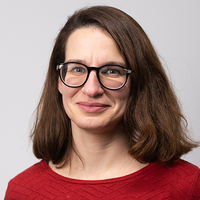University Medical Center (UMC) Mainz
Maria Felicia Basilicata Christian Behl Benedikt Berninger Luciana Berod Tobias Bopp Andreas Daiber Sven Danckwardt Carsten Deppermann Stephan Grabbe Thomas Hofmann Thomas Kindler Daniela Kramer Daniela Krause Dilja Krueger-Burg Michael Kühn Beat Lutz Johannes Mayer Wolfram Ruf Katrin Schäfer Susann Schweiger Natalia Soshnikova Tim Sparwasser Oliver Tüscher Sara Vieira-Silva Ari Waisman Philipp Wild Jennifer Winter Fatemeh Zare-ShahnehHuman microbiome ecology
Our lab explores the ecology of host-associated microbial communities, with a focus on the human gastrointestinal tract. Our research focuses on understanding the ecological dynamics of human gut-associated microbial communities in healthy host-microbiome homeostasis and how their disturbance contributes to the risk of disease onset or progression. We apply quantitative approaches to population cohort studies and intervention trials to identify the mechanisms that drive the dynamics of the gut ecosystem in health, the determinants of its resilience to perturbations and the alterations that contribute to disease (dysbiosis). We base our research on dataset generated by hypothesis-driven experimental design, and invest in the continuous development of bioinformatic tools to extract interpretable traits from metagenomic data as well as computational approaches to quantify ecological dynamics and host-microbiome interactions.
Positions held
- Since 2022: Professor of Mucosal Professor of Mucosal Microbiology and Immunology, University Medical Center (UMC), Mainz, Germany
- Since 2022: Adjunct Director, Institute of Molecular Biology (IMB), Mainz, Germany
- 2015 - 2022: Postdoctoral researcher, Catholic University of Leuven (KU Leuven), Leuven, Belgium
- 2011 - 2015: Postdoctoral researcher, Free University of Brussels (VU Brussel), Brussels, Belgium
- 2011 - 2015: Postdoctoral researcher, Institut Pasteur, Paris, France
Education
- 2010: PhD in Genomics, Université Pierre et Marie Curie (Paris 6), Paris, France
- 2006: PhD program in Computational Biology (PDBC), Instituto Gulbenkian de Ciência, Oeiras, Portugal
- 2003: Diploma in Biology, Faculty of Sciences of the University of Lisbon (FCUL), Portugal
Selected publications by Sara Vieira-Silva
Vieira-Silva S, Falony G, Belda E, … Bäckhed F, Clément K and Raes J (2020) Statin therapy is associated with lower prevalence of gut microbiota dysbiosis. Nature, 581:310–315 Link
Valles-Colomer M, Falony G, Darzi Y, Tigchelaar EF, Wang J, Tito RY, Schiweck C, Kurilshikov A, Joossens M, Wijmenga C, Claes S, Van Oudenhove L, Zhernakova A, Vieira-Silva S and Raes J (2019) The neuroactive potential of the human gut microbiota in quality of life and depression. Nat Microbiol, 4:623–632 Link
Falony G, Vieira-Silva S and Raes J (2018) Richness and ecosystem development across faecal snapshots of the gut microbiota. Nat Microbiol, 3:526–528 Link
Falony G, Joossens M, Vieira-Silva S, Wang J, Darzi Y, Faust K, Kurilshikov A, Bonder MJ, Valles-Colomer M, Vandeputte D, Tito RY, Chaffron S, Rymenans L, Verspecht C, De Sutter L, Lima-Mendez G, D’hoe K, Jonckheere K, Homola D, Garcia R, Tigchelaar EF, Eeckhaudt L, Fu J, Henckaerts L, Zhernakova A, Wijmenga C and Raes J (2016) Population-level analysis of gut microbiome variation.Science, 352:560–564 Link
Vieira-Silva S, Falony G, Darzi Y, Lima-Mendez G, Garcia Yunta R, Okuda S, Vandeputte D, Valles-Colomer M, Hildebrand F, Chaffron S and Raes J (2016) Species-function relationships shape ecological properties of the human gut microbiome. Nat Microbiol, 1:16088 Link
